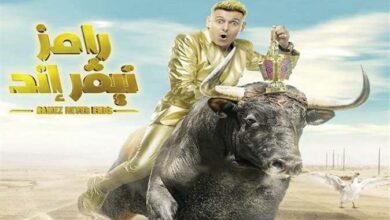The first day of Ramadan began this year with a new TV show, “Ramez Qalb al-Assad” – Ramez, Heart of the Lion – on the satellite TV station Al-Hayat, which features the famous actor Ramez Galal and a lion.
The concept of the show is simple: Guests are invited to step in an elevator, and when the doors open, they might end up face to face with a caged lion, and Ramez Galal plays pranks on them in the elevator.
This new show has naturally enraged animal rights activists.
“How can one humiliate one of God’s creatures this way?” explodes Amira Tharwat Abaza, chairwoman of the Society for the Protection of Animal Rights in Egypt (SPARE). “This show belongs to the Middle Ages – they should be ashamed to air in 2011 such a stupid show!” she adds.
Golas Asat, a SPARE veteran, is opposed to the general idea of a television broadcast that uses live animals.
“You can’t just use animals in a TV show just for fun and make people laugh,” Asat says.
Asat explains that the 13-year-old lion was given sedatives so it wouldn’t move or become aggressive, endangering the guests: “In medicine, you don’t give [animals] sedatives unless it’s an emergency or for a specific treatment."
According to Asat, the excess of sedatives could have an impact of the animal’s mood and appetite. “[The animal] isn’t aware of what is going on around him, which might change its behavior and make it go crazy.”
Not only might the lion become more nervous, but it might become more dangerous to people around, since it’s impossible to “be 100 percent sure that nothing will happen in its head that will make it act crazy all of a sudden,” Asat says.
After the massive uproar by animal rights organizations, led by animal rights advocate Dina Zuflikar on social media such as Facebook, the producer of the show, Abdallah Befatour, asserted that he would include a warning screen at the beginning of the show stating that individuals shouldn’t reproduce the stunts at home and that they might harm the animal.
Of the screen warning, Abaza says, "It’s stupid because many people are illiterate."
Asat welcomes Befatour’s move, but at the same time he seriously doubts that the advice will matter.
“The way that people see animals might change and indirectly push people to reproduce this," he says, worried that the audience might unconsciously treat animals, such as their pets or street animals, with less respect than they would before.
During a recent conversation with animal rights organizations, Befatour acknowledged that he wasn’t aware that such treatment might harm the lion, Zulfikar said.
Befatour declined several requests for an interview with Al-Masry Al-Youm.
Yet the issue about the use of animals for entertainment purposes remains latent.
“Where does this lion come from and why is it so easy to get a wildlife animal for a TV show?” Abaza wonders.
According to Abaza and Zulfikar, these shows are unacceptable, and the Cairo office enforcing the Convention on International Trade in Endangered Species has not done its job properly.
“We need to tackle this issue from its roots,” claims Abaza. "[Veterinarians] here don’t know anything about animals, or if they do, they don’t care about them."
"If Befatour was really honest," she continues, “he wouldn’t have done [the show] at all.”



